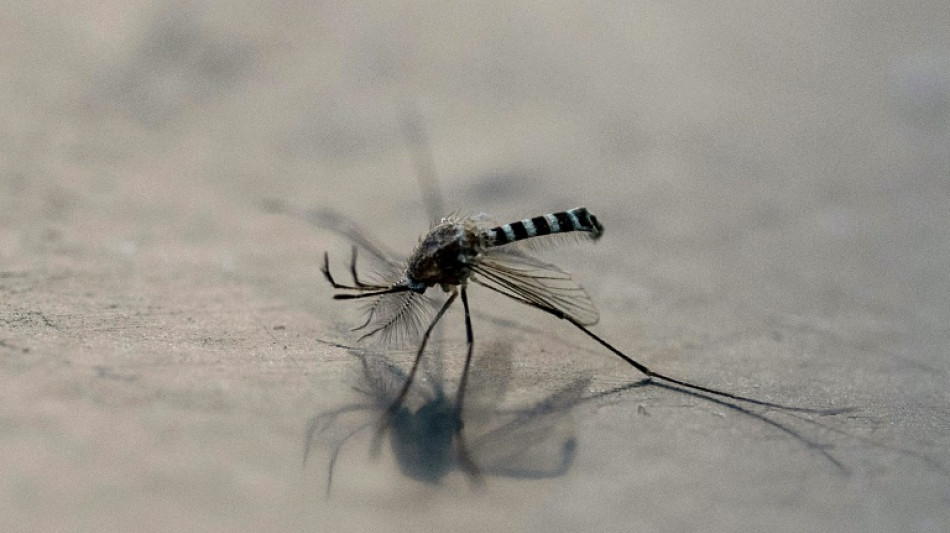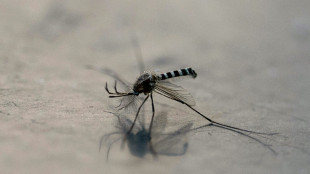
-
 Japan startup hopeful ahead of second moon launch
Japan startup hopeful ahead of second moon launch
-
Ukraine allies to hold last defence meet before Trump takes office

-
 Myanmar military adopts anti-junta fighters' drone tactics
Myanmar military adopts anti-junta fighters' drone tactics
-
CES tech looks to help world's aging population

-
 Rubber tappers forge sustainable future in Amazon
Rubber tappers forge sustainable future in Amazon
-
US astronauts upbeat seven months into eight-day mission

-
 Extreme weather, suburban sprawl fuel LA's wildfires
Extreme weather, suburban sprawl fuel LA's wildfires
-
Political chess or true beliefs? Zuckerberg's surprise Trump pivot

-
 US Fed officials concerned over 'stalled' disinflation, tariffs: minutes
US Fed officials concerned over 'stalled' disinflation, tariffs: minutes
-
Celebrities flee Los Angeles fires as Hollywood events scrapped

-
 Several US Fed officials concerned over 'stalled' disinflation: minutes
Several US Fed officials concerned over 'stalled' disinflation: minutes
-
US tech titans ramp up pressure on EU

-
 'Wicked' tops SAG Awards nominations
'Wicked' tops SAG Awards nominations
-
Safe from looting, Damascus museum reopens a month after Assad's fall

-
 Award-winning migrant actor earns visa to stay in France -- as a mechanic
Award-winning migrant actor earns visa to stay in France -- as a mechanic
-
Celebrities forced to flee Los Angeles blazes

-
 US tariff and inflation fears rattle global markets
US tariff and inflation fears rattle global markets
-
US private sector hiring undershoots expectations: ADP

-
 US tariffs unlikely to have 'significant' inflation impact: Fed official
US tariffs unlikely to have 'significant' inflation impact: Fed official
-
Lebanon leaders in talks for new bid to elect president

-
 Antarctic sea ice rebounds from record lows: US scientists
Antarctic sea ice rebounds from record lows: US scientists
-
Can EU stand up to belligerent Big Tech in new Trump era?

-
 US, Canadian and Australian travellers now face UK entry fee
US, Canadian and Australian travellers now face UK entry fee
-
Indonesia upholds iPhone 16 sales ban after Apple offers $1 bn investment

-
 UK's Catherine turns 43 hoping for better year
UK's Catherine turns 43 hoping for better year
-
OpenAI chief Sam Altman denies sister's sexual abuse accusations

-
 Germans turn to balcony solar panels to save money
Germans turn to balcony solar panels to save money
-
Samsung warns fourth-quarter profit to miss forecasts

-
 Brazil gears up for first climate conference in Amazon
Brazil gears up for first climate conference in Amazon
-
Iraqi archaeologists piece together ancient treasures ravaged by IS

-
 Big Tech rolls out the red carpet for Trump
Big Tech rolls out the red carpet for Trump
-
Former US president Carter lies in state after somber Washington procession

-
 US company Firefly Aerospace to launch for Moon next week
US company Firefly Aerospace to launch for Moon next week
-
No proof fentanyl produced in Mexico, president says

-
 Biotech Startups Get a Boost: ZAGENO and Hatch.Bio Labs Partner to Streamline Lab Operations
Biotech Startups Get a Boost: ZAGENO and Hatch.Bio Labs Partner to Streamline Lab Operations
-
Mosquitoes with 'toxic' semen could stem disease spread: research

-
 NASA eyes SpaceX, Blue Origin to cut Mars rock retrieval costs
NASA eyes SpaceX, Blue Origin to cut Mars rock retrieval costs
-
Invisible man: German startup bets on remote driver

-
 US urged to do more to fight bird flu after first death
US urged to do more to fight bird flu after first death
-
Inflation concerns pull rug out from Wall Street rally

-
 Frigid temps hit US behind major winter storm
Frigid temps hit US behind major winter storm
-
US trade deficit widens in November on imports jump

-
 Key dates in the rise of the French far right
Key dates in the rise of the French far right
-
Hundreds of young workers sue McDonald's UK alleging harassment

-
 Eurozone inflation rises, likely forcing slower ECB rate cuts
Eurozone inflation rises, likely forcing slower ECB rate cuts
-
Microsoft announces $3 bn AI investment in India

-
 French far-right figurehead Jean-Marie Le Pen dies
French far-right figurehead Jean-Marie Le Pen dies
-
Pope names Sister Brambilla to head major Vatican office

-
 Eurozone inflation picks up in December
Eurozone inflation picks up in December
-
Japan actor fired from beer ad after drunken escapade


Mosquitoes with 'toxic' semen could stem disease spread: research
Genetically engineered mosquitoes with toxic semen could be a new weapon against tropical disease, Australian scientists said after trialling the novel pest control method.
The "toxic male technique" aims to breed mosquitoes that express venomous proteins in their semen, killing off females after mating.
Female mosquitoes are targeted because only they bite and drink blood, thereby spreading diseases such as malaria and dengue fever.
Scientist Sam Beach from Australia's Macquarie University said the method "could work as quickly as pesticides without also harming beneficial species".
"This innovative solution could transform how we manage pests, offering hope for healthier communities and a more sustainable future."
The first proof-of-concept trials used fruit flies, a common laboratory species favoured for its short two-week life cycle.
Female flies that bred with "toxic" males had a significantly reduced lifespan, the scientists found.
Researcher Maciej Maselko said the team would now trial the method in mosquitoes.
"We still need to implement it in mosquitoes and conduct rigorous safety testing to ensure there are no risks to humans or other non-target species," he said.
Genetic engineering has been used for years to control populations of disease-spreading mosquitoes.
Typically, these approaches slow reproduction by releasing hordes of male insects that are genetically modified to be sterile.
Computer models showed techniques actively killing biting females could be far more effective, the research team said.
The research was described in a paper published by peer-reviewed journal Nature Communications on Tuesday evening.
S.F.Lacroix--CPN
